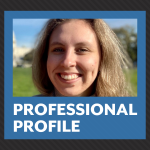Editorial Analyst, American Chemical Society
 |
Summarize yourself and professional experience in a few sentences (where you’re from, course of study, where you currently work, job title).
I am from and currently reside in the Washington, DC, area. I received my Bachelor of Science Honours in Neuroscience from the University of St Andrews in 2019 before returning to the US. My professional experience began in the customer service industry, preparing me for my previous role at the Society for Neuroscience where I managed the journal submission and peer review processes. Currently, I work as an Editorial Analyst with the American Chemical Society assisting with the peer review processes by maintaining the peer review system and supporting the editorial offices across the journal portfolio.
Please describe the main function of your organization and your current responsibilities.
The American Chemical Society was founded almost 150 years ago and maintains the following mission: “to advance the broader chemistry enterprise and its practitioners for the benefit of Earth and all its people… [in order] to improve all people’s lives through the transforming power of chemistry.”
My role as an Editorial Analyst resides within the Global Editorial Operations, a group within the greater Publications Department. We strive to produce author-first processes that allow our portfolio of over 80 active chemistry journals to thrive and produce the most up-to-date and relevant chemistry research. I work to support our editorial teams to ensure they are prepared to provide the best author and reviewer experience by training them on best practices and maintaining the systems and interfaces used for these processes.
How did you get into scholarly communications, and what was your path to your current role?
After graduating with my degree in Neuroscience, I realized that my passion and love for science lie in the communication and dissemination of research to those who enjoy and benefit from the science. My goal when applying to post-graduate positions was to discover a pathway that allowed me to remain in the scientific community within reach of novel research. I applied to different roles within scholarly publications, editorial roles, communications roles, administrative roles, and more before finding a role as an Editorial Assistant with the Society for Neuroscience. I assisted authors, reviewers, editors, and others with navigating the submission and peer review processes. This position provided me with an introduction to scholarly publishing and nourished my passion for the science publication community. Following more than a year with SfN, I accepted a position as an Editorial Analyst with the American Chemical Society. I provide support to the editorial teams, including managing and content editors, manuscript admin, and support for the 80+ expanding journals that ACS publishes.
What tools, websites, and organizations do you find most valuable for your career development?
While the industry spans all seven continents, the community feels like a small world. Whether you join online groups, participate in organizations, attend conferences, or search for the term “scholarly communication” on LinkedIn or Twitter, you cultivate a personal network of peers that can show you the ropes or lead you down a new path you didn’t even know was possible. Nourishing these relationships and joining in when the opportunity arises has been the most useful tool for expanding my view of the industry. Organizations, such as SSP, provide mentoring and early career communities and meetings (virtual or physical), offering a jumping-off point to enter into the multifaceted world of scholarly publishing and communications. Blogs such as The Scholarly Kitchen provide up-to-date information on the industry as well as newsworthy content from individuals within the field. Exploring any of these media outlets will bring a deeper understanding of scholarly publishing, a rabbit hole that never quite reaches Wonderland.
What advice would you give to people interested in a career in scholarly communications?
A career in scholarly communications is a brilliant alternative path for postgraduates to continue their engagement in academia and research. The field of scholarly communications is multifaceted. Whether you are inclined toward science or history, multimedia or print, editorial or marketing, there is a place for you and your skills in scholarly communications. One of the most important things I learned was how marketable my skills were with my undergraduate degree and customer service work experience. Scholarly communication builds interactions and relationships across academics, librarians, students, colleagues, government organizations, and the general public. Adaptability, flexibility, and communication skills are some of the most important and valuable skills to foster, especially in the ever-shifting field of scholarly communications and publishing.
Any fun facts or hobbies outside of scholarly communications?
Outside of scholarly publishing and communication, I spend most of my time finding the next concert I can attend, near or far (I am currently planning a trip to Europe based on a concert date), planning my next adventure, and petting any dog I come across.
Career Level: Early Career (0-5 years)
Industry area: Editorial

